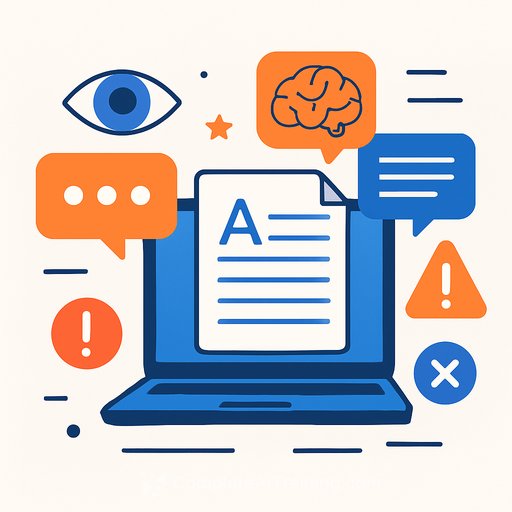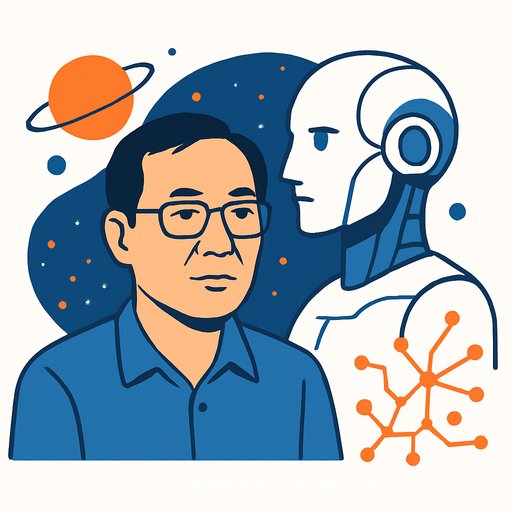AI vs Human Writing: A Practical Playbook for Working Writers
AI vs human writing isn't a theory test. It changes how students approach assignments, and it changes how you, as a writer, position your work, your ethics, and your workflow.
Students can spin up drafts in seconds. Universities can detect AI-like text just as fast. That tension creates opportunity for writers who offer real expertise, and risk for anyone drifting into ghostwriting for grades.
AI's Surge in Student Workflows
Generative tools are now a routine part of study habits. Students use them for ideas, outlines, and quick passes over grammar and style.
The draw is obvious: speed, convenience, and a shot at beating deadlines. But speed isn't the same as scholarship. AI can sound confident and still be wrong, repetitive, or citation-poor.
What AI Does Well for Writers
- Idea generation: produce multiple angles in minutes
- Outlines: structure a logical sequence to write against
- Language polish: grammar, tone, and clarity passes
- Variation: headline options, section rewrites, hooks
Use AI as a thinking partner, not a thinking replacement. Your edge is judgment, context, and voice.
The Risks Students Face (And Why Writers Should Care)
Universities are pairing plagiarism checks with AI-detection signals and manual review. Repetitive phrasing, shallow logic, and weak citations are easy tells.
Consequences include failed assignments and academic penalties. Writers who ghostwrite assignments are part of that risk chain. Don't put clients-or yourself-there.
If you discuss AI with clients, point them to ethical use and proper citation. For reference, see APA's guidance on citing AI tools
APA guidance on citing ChatGPT
Pros and Cons: AI in Academic Contexts
- Pros: speed, low cost, grammar/style help, brainstorming support
- Cons: shallow or inaccurate claims, generic tone, weak references, detection risk, ethical concerns
Why Human Expertise Still Wins
Human writers apply domain knowledge, research craft, and context. We connect evidence to argument, adapt to brief-specific nuances, and maintain voice across a piece.
In academic settings, that means building claims from credible sources, validating facts, and aligning with assignment goals. That's precision work-something AI imitates, but does not consistently achieve.
Important Ethics Note for Working Writers
Ghostwriting graded assignments violates most institutional policies. Do not sell essays for academic submission. Offer ethical services: coaching, outlining, research guidance, editing, and feedback that helps the student do the writing.
This protects your reputation and your clients. It also builds a long-term practice grounded in value, not shortcuts.
AI vs Human: Side-by-Side for Writers
- Speed
AI: instant drafts
Human: hours to days - Originality
AI: template-like phrasing, repetition risk
Human: contextual, consistent voice - Critical thinking
AI: surface-level patterns
Human: nuance, synthesis, tradeoffs - Accuracy
AI: may fabricate or misattribute sources
Human: verifies, cites, cross-checks - Academic integrity
AI: detectable patterns, policy risk
Human: ethical coaching and editing are safe - Cost
AI: free to low-cost
Human: higher, aligned to expertise - Reliability
AI: can glitch or hallucinate
Human: accountable, revisable
For Writers: What to Offer vs What to Avoid
- Offer
- Idea mapping and research planning
- Outline development and rubric alignment
- Source evaluation and citation coaching
- Line editing for clarity, coherence, and style
- Feedback that teaches the student to improve their own draft
- Avoid
- Writing graded essays for submission
- Providing "original" papers for academic credit
- Claiming AI-written content is safe to submit as-is
A Practical, Ethical Workflow You Can Use
- Clarify the brief: goals, audience, grading criteria, sources required
- Scope the research: credible sources first; note quotes, stats, and page numbers
- Outline with constraints: thesis, sections, evidence per section, required citations
- AI assist: generate variants for headlines or structure; never accept facts without verification
- Draft in your voice: write claims, integrate evidence, attribute everything
- Fact-check: confirm every stat and quote; replace weak sources
- Edit in passes: logic, clarity, style, then grammar
- Document AI use: if AI informs brainstorming or editing, advise clients on disclosure and citation based on their policy
When Students Should Use AI vs Human Help
- Use AI for
- Topic brainstorming and narrowing focus
- Outline scaffolds under time pressure
- Grammar and style polishing on student-written drafts
- Use human help for
- High-stakes research design and argument structure
- Voice development and clarity coaching
- Source vetting and proper citation
Detection, Policies, and Your Risk Management
Institutions are actively reviewing AI-like submissions. Even if a detector isn't used, instructors can spot generic phrasing, thin logic, and mismatched voice.
To understand how detection is discussed, see this overview
How Turnitin describes AI writing indicators
Bottom line for writers: keep your services on the right side of policy. Coach and edit; don't substitute your work for a student's graded deliverable.
Positioning Your Services as a Writer
- Lead with outcomes: critical thinking, clarity, and credible sourcing
- Package ethically: coaching sessions, outline builds, feedback cycles
- Use AI transparently: as a drafting and editing accelerator, never as the final author
- Document process: notes, sources, and revision history to show your value
Tools and Training to Stay Sharp
Keep your AI skills current without losing the fundamentals of research, argument, and style. If you want curated options for writing workflows, this catalog can help
AI tools for copywriting: curated picks and use cases
Final Take
AI is a useful assistant. It's fast, cheap, and great for ideation and polish. It is not a substitute for research, reasoning, or authorial voice.
For writers, the opportunity is clear: combine AI's efficiency with human judgment, ethics, and craft. Help students learn; don't write their grades. That's how you protect your business and your reputation-and deliver work that stands up to scrutiny.
Your membership also unlocks:






